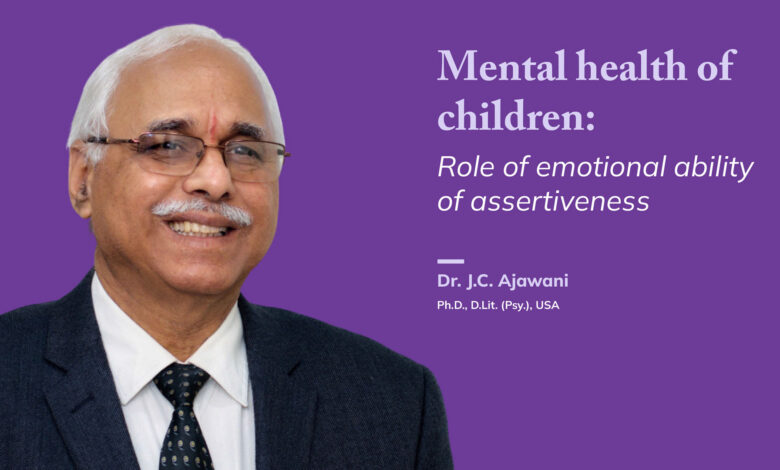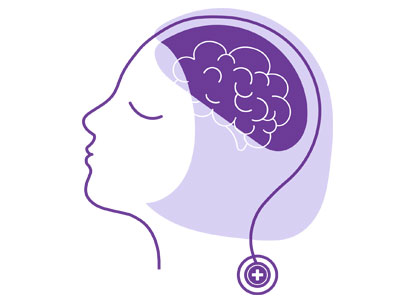Mental health of children: Role of emotional ability of assertiveness
Dr. J.C. Ajawani Ph.D., D.Lit. (Psy.), USA

Despite significant advancements in clinical psychology research, the mental well-being of children remains an area that is often neglected. This is as if children are incapable of experiencing stress to the point where it may be considered as abnormal behaviour. But the fact is, they are the innocent victims of their parents’ maladaptive behaviour. In most cases of children brought to psychiatrists, paediatric neurologists, or psychologists, parental neglect, over-pampering, personality conflicts, and unhealthy communication among family members are the root causes of deviated childhood personality. It is well evident that the mother’s mental state has a vital impact on the child even when she/he is in the mother’s womb. I have observed that the mother’s unhealthy mental status during her pregnancy had precipitated stillbirth, ADHD, ASD, psychopathic personality, aggression, extreme maladaptive behaviour, lack of attention on academics, poor attachment with parents or emotional insulation and even in some cases mental retardation due to delayed birth cry are a few unhealthy behaviour patterns seen in children who suffered excessive stress during their womb period due to their parental conflicts. In most cases, such abnormal behaviour remains unidentified due to considering them as normal childhood behaviour. However, when it continues with an increase in age or gets worsened, then only parents show their concern about the unhealthy behaviour of their grown-up children.

When we go through the story of Abhimanyu, the son of Arjuna, in Mahabharat, we find clear-cut evidence of learning during the womb period. Recently, photographs of fetuses in the womb have shown that they show emotions of basic nature due to incidences inside and outside the womb. The post-natal environment also plays a vital role in the personality development of a child. This environment has a wide span starting from parents to people around him in the family, neighbourhood, school, and so on, physically and psychologically too. Nowadays, due to heavy exposure to the digital world, a new unhealthy pattern of behaviour is observed in so many children whose parents have deliberately permitted their children to remain involved in interactions with the technological world, an illusional state wherein they struggle to prove themselves as Hero or suffer illusionary victim state leading more serious mental issues. Another unavoidable situation is both parents as working outside the home.
The mental health of latchkey children deteriorates if not properly handled by such parents. Eating disorders, insecurities, loneliness, etc. are essential outcomes when such children are not entertained properly by their parents when they come back home. In a nutshell, I personally feel that modern children are UNHEARD CHILDREN. Parents either don’t have time to listen to them or they don’t realize the importance of communication with their children due to their so-called perceived self-occupancy. This pathetic situation is hazardous for the mental health of these unheard children pushing them towards physical and vocal violence, stubbornness, unhealthy attentionseeking behaviour or indulgence with nonhuman models.
It’s high time now to realize this critical situation before it becomes uncontrollable. The assets must not turn into a burden. In my opinion, ASSERTIVENESS is one non-cognitive ability under the domain of Emotional Intelligence which needs to be inculcated in children right from their early childhood period and shall continue to enhance this ability of assertiveness till the last breath. The essence of assertiveness is understanding that all people have certain rights. Everyone must recognise their own rights, and those of other people so that none shall hurt anyone else while exercising his own rights. Self-confidence and a feeling of worthiness are core to assertive behaviour. Parents should put in efforts to build up selfconfidence in themselves as well as in their children, for which they need to think, feel, and act positively. (Civil, 2003). A child will get much more out of his life if he is able to give and receive compliments. He shall be taught to enjoy, and not shrink from praise. He must be taught to congratulate people rather than criticise them. It is also important for parents to be role models for their children to give positive rather than negative messages to people if they want their children to be perceived as being assertive. Though saying ‘No’ to any person may be difficult, but parents must teach their children by role modelling and further explaining about saying NO. Saying ‘No’ is assertive only when a person shall say ‘No’ in a particular situation and that too without hurting the person/s, that’s why it shall be explained to the children so that they must not be judged aggressively or suffer submissiveness. There will be times when our children are criticized, so it is important that we shall be able to teach our children to handle criticism in a way that is productive to them and the critic too. The parents shall inculcate values in their children to treat everyone fairly, regardless of their values (and despite their own prejudices). The children shall be presented with examples of asserting their own values in both words and deeds, that is, speaking honestly and directly while recognizing that others also have values (Civil, 2003). I am sure assertiveness, as a non-cognitive intrapersonal ability, will be a protecting factor in maintaining the good mental health of children. So parents and all significant persons around the children shall promote the inculcation of assertiveness in him. The teachers, too, can play vital roles in this regard.
Assertiveness is one non-cognitive ability which needs to be inculcated in children
Reference:
Civil, J. (2003). Assertiveness. Spiro Press Represented by Cathy Miller Foreign Rights Agency, London, England.





